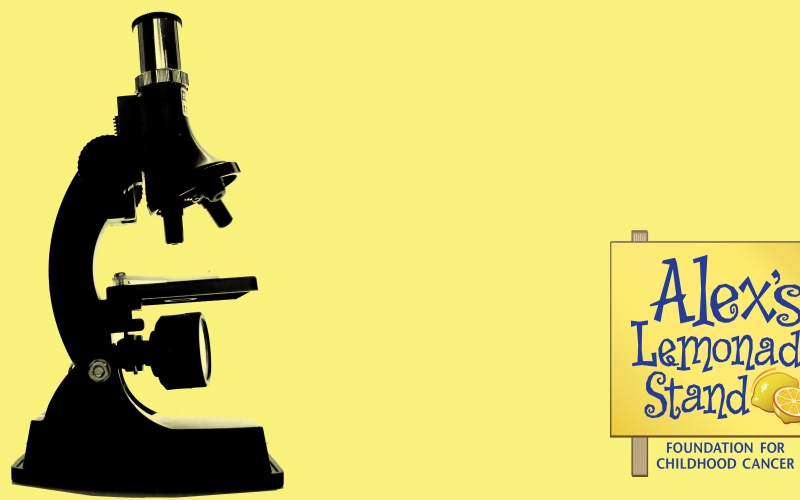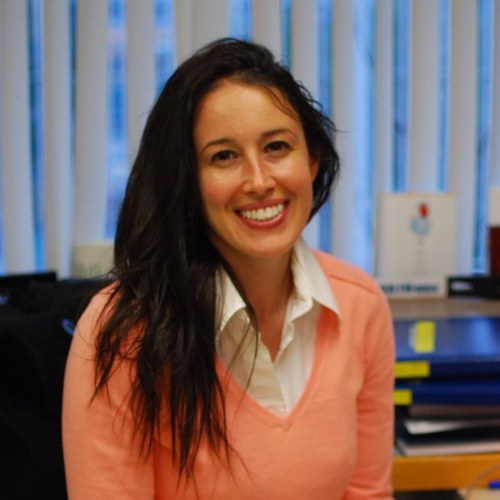
by Trish Adkins, ALSF
Breakthroughs and cures for childhood cancer are only possible through comprehensive, cutting-edge research performed by the best minds in pediatric oncology. Each year, Alex’s Lemonade Stand Foundation (ALSF) provides grants to these oncology superstars—ensuring the future of research will mean safer treatments and more cures for children.
Our grants program funds all phases of research—from early career and student research to clinical trial support—through 13 different grant programs. Each potential project is given careful consideration and review by our Scientific Advisory Board, made up of leading scientists and clinicians.
Two research grant areas: The ‘A’ Award and the Bio-Therapeutic Impact Grant programs address the full spectrum of research providing funding for early and late-career scientists who are studying hard-to-treat, high-risk cancers. The 'A' Award is designed specifically for the early independent career scientist who wants to establish a career in pediatric oncology research. The Bio-Therapeutic Impact Grant accelerates a project closer to clinical trial, bringing promising treatments to children waiting for cures.
Meet three of our latest grant recipients and find out how they are powering breakthroughs, one research project at a time:
Fighting Neuroblastoma with Natural Killer T-Cells: Andras Heczey, MD, Baylor College of Medicine
 Dr. Heczey, a 2017 ALSF Bio-Therapeutics Impact Grantee, is developing a novel form of cancer immunotherapy for children with neuroblastoma. His therapeutic will use Natural Killer T cells (NKTs) which are part of the immune system. Their presence and/or absence could have implications in the development of cancer. Dr. Heczey altered NKTs in the lab with the hopes that these newly engineered cells could lead to the development of NKT cell-based immunotherapy for neuroblastoma, as well as have an application for other types of childhood cancer. His funded research will accelerate NKT immunotherapy closer to the clinical trial stage.
Dr. Heczey, a 2017 ALSF Bio-Therapeutics Impact Grantee, is developing a novel form of cancer immunotherapy for children with neuroblastoma. His therapeutic will use Natural Killer T cells (NKTs) which are part of the immune system. Their presence and/or absence could have implications in the development of cancer. Dr. Heczey altered NKTs in the lab with the hopes that these newly engineered cells could lead to the development of NKT cell-based immunotherapy for neuroblastoma, as well as have an application for other types of childhood cancer. His funded research will accelerate NKT immunotherapy closer to the clinical trial stage.
Targeting Synovial Sarcoma: Cigall Kadoch, PhD, Dana-Farber Cancer Institute
 Dr. Kadoch, a recipient of The ‘A’ Award, is studying the genetics of synovial sarcoma, an aggressive soft-tissue malignancy that is largely resistant to conventional chemotherapy-based treatments. Synovial sarcomas all share a common chromosomal translocation—a genetic event in which two proteins abnormally fuse together in the DNA. The result is the development of abnormal cells. Dr. Kadoch will study this genetic phenomenon, work to understand the underlying mechanisms that cause it to happen and provide insights on how this translocation could be refused, with the aim of eventually developing highly-targeted drugs that can stop synovial sarcoma.
Dr. Kadoch, a recipient of The ‘A’ Award, is studying the genetics of synovial sarcoma, an aggressive soft-tissue malignancy that is largely resistant to conventional chemotherapy-based treatments. Synovial sarcomas all share a common chromosomal translocation—a genetic event in which two proteins abnormally fuse together in the DNA. The result is the development of abnormal cells. Dr. Kadoch will study this genetic phenomenon, work to understand the underlying mechanisms that cause it to happen and provide insights on how this translocation could be refused, with the aim of eventually developing highly-targeted drugs that can stop synovial sarcoma.
Unpackng Leukemia: Andrew Lane, MD/PhD of Dana-Farber Cancer Institute
 Dr. Lane, a current 'A’ Award and past Young Investigator grantee, will study how DNA “unpacking” promotes acute myeloid leukemia (AML). Children diagnosed with AML have a poor survival rate. Dr. Lane believes that the physical structure of DNA could be important in leukemia development. He explained that if the DNA in a cell was stretched out, or unpacked, it would be six feet long. Yet to work properly, DNA needs to be tightly packed together into a space as small as the head of a pin. Under the microscope, leukemia DNA does not appear to be as tightly wound as it should, leading researchers to believe that problems in DNA packing can lead to the development of AML. Dr. Lane will study this phenomenon and will test if the drugs that target DNA packing can also kill leukemia cells.
Dr. Lane, a current 'A’ Award and past Young Investigator grantee, will study how DNA “unpacking” promotes acute myeloid leukemia (AML). Children diagnosed with AML have a poor survival rate. Dr. Lane believes that the physical structure of DNA could be important in leukemia development. He explained that if the DNA in a cell was stretched out, or unpacked, it would be six feet long. Yet to work properly, DNA needs to be tightly packed together into a space as small as the head of a pin. Under the microscope, leukemia DNA does not appear to be as tightly wound as it should, leading researchers to believe that problems in DNA packing can lead to the development of AML. Dr. Lane will study this phenomenon and will test if the drugs that target DNA packing can also kill leukemia cells.
Read more about our grants programs here.

